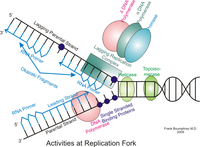
Photo from wikipedia
Simple Summary Cervical cancers (CaCx) are caused by the expression of human papillomavirus oncogenes (HPV E6 and E7). Here, in vitro assays, computational approaches and immunohistochemical analysis of cervical biopsies… Click to show full abstract
Simple Summary Cervical cancers (CaCx) are caused by the expression of human papillomavirus oncogenes (HPV E6 and E7). Here, in vitro assays, computational approaches and immunohistochemical analysis of cervical biopsies show that HPV oncogenes impair translesion synthesis (TLS). This limits the pathway’s ability to prevent replication stress from causing fork collapse and DNA damage. As a result, HPV oncogenes make cells more sensitive to replication stressing agents, such as Cisplatin. Mechanistically, HPV E6 prevents replication stress from triggering the accumulation of a TLS-specific polymerase (POLη). Supplying exogenous POLη to CaCx cells rescues TLS and lowers Cisplatin toxicity. Abstract High risk genus α human papillomaviruses (α-HPVs) express two versatile oncogenes (α-HPV E6 and E7) that cause cervical cancer (CaCx) by degrading tumor suppressor proteins (p53 and RB). α-HPV E7 also promotes replication stress and alters DNA damage responses (DDR). The translesion synthesis pathway (TLS) mitigates DNA damage by preventing replication stress from causing replication fork collapse. Computational analysis of gene expression in CaCx transcriptomic datasets identified a frequent increased expression of TLS genes. However, the essential TLS polymerases did not follow this pattern. These data were confirmed with in vitro and ex vivo systems. Further interrogation of TLS, using POLη as a representative TLS polymerase, demonstrated that α-HPV16 E6 blocks TLS polymerase induction by degrading p53. This doomed the pathway, leading to increased replication fork collapse and sensitivity to treatments that cause replication stress (e.g., UV and Cisplatin). This sensitivity could be overcome by the addition of exogenous POLη.
Journal Title: Cancers
Year Published: 2020
Link to full text (if available)
Share on Social Media: Sign Up to like & get
recommendations!